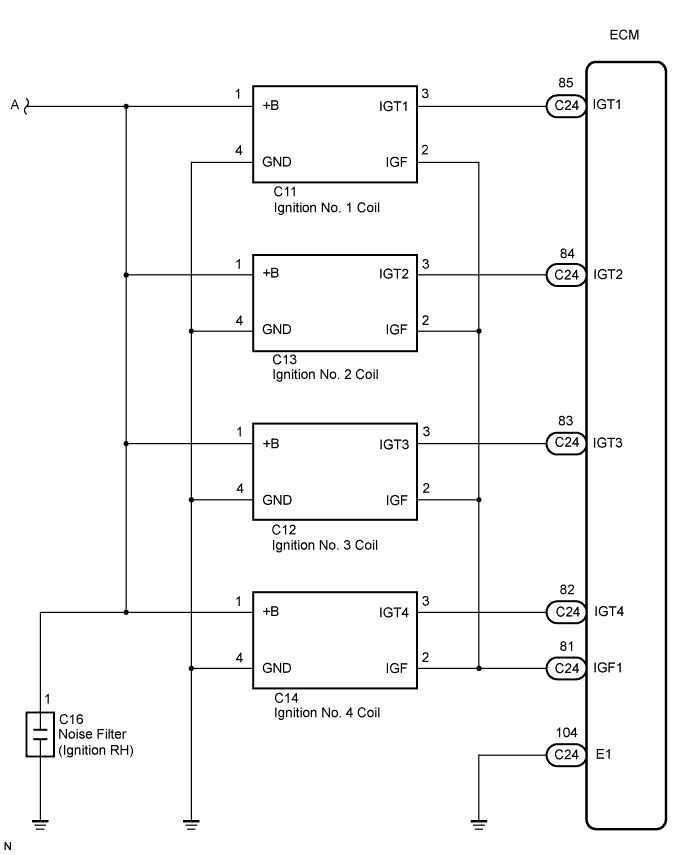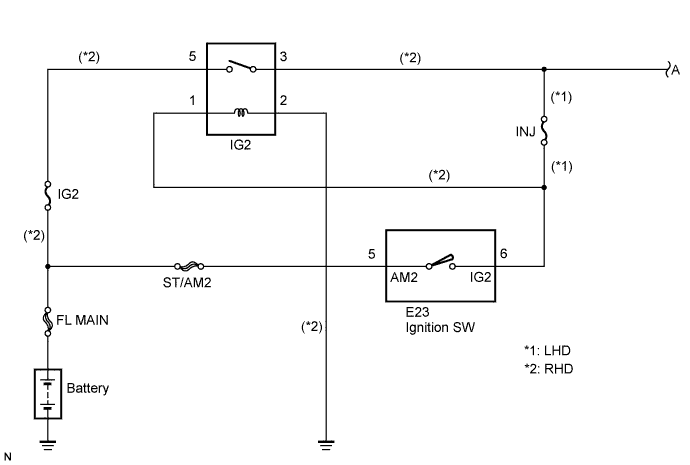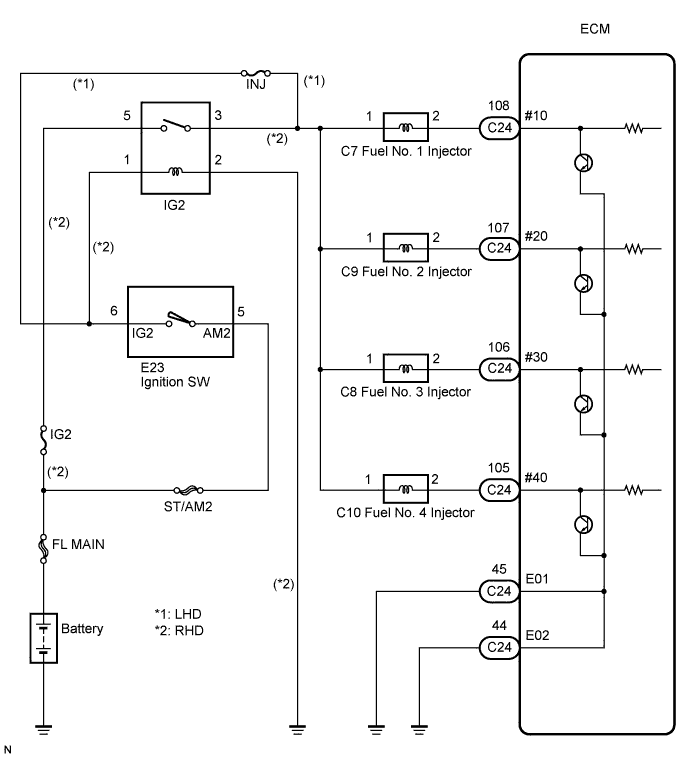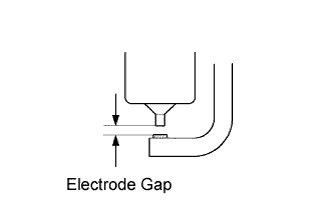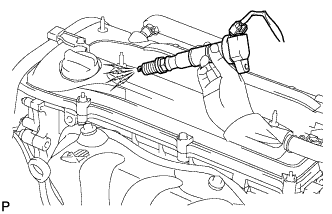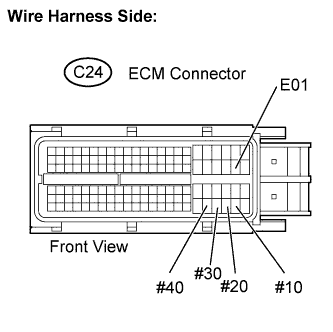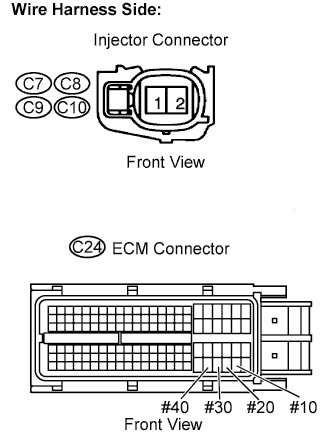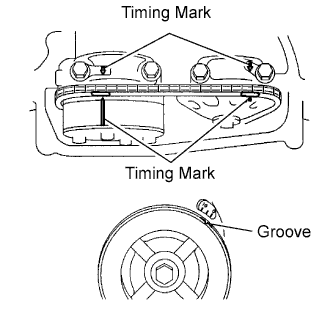DESCRIPTION
WIRING DIAGRAM
CONFIRMATION DRIVING PATTERN
INSPECTION PROCEDURE
CHECK ANY OTHER DTCS OUTPUT (IN ADDITION TO MISFIRE DTCS)
READ VALUE USING INTELLIGENT TESTER (MISFIRE RPM AND MISFIRE LOAD)
CHECK VENTILATION HOSE CONNECTIONS
CHECK MISFIRE COUNT (CYLINDER #1, #2, #3 AND #4)
PERFORM ACTIVE TEST USING INTELLIGENT TESTER (FUEL CUT #1 TO #4)
CHECK SPARK PLUG
CHECK FOR SPARKS
CHECK CYLINDER COMPRESSION PRESSURE OF MISFIRING CYLINDER
CHECK NORMAL SPARK PLUG AND CHECK FOR SPARKS OF MISFIRING CYLINDER
INSPECT ECM TERMINAL OF MISFIRING CYLINDER (#10, #20, #30 AND/OR #40 VOLTAGE)
CHECK HARNESS AND CONNECTOR (INJECTOR - ECM)
CHECK FUEL INJECTOR OF MISFIRING CYLINDER
CHECK VALVE CLEARANCE OF MISFIRING CYLINDER
CHECK AIR INDUCTION SYSTEM
READ VALUE USING VALVE TIMING
CHECK FUEL PRESSURE
READ VALUE USING INTELLIGENT TESTER (COOLANT TEMP)
READ VALUE USING INTELLIGENT TESTER (MAF)
DTC P0300 Random / Multiple Cylinder Misfire Detected |
DTC P0301 Cylinder 1 Misfire Detected |
DTC P0302 Cylinder 2 Misfire Detected |
DTC P0303 Cylinder 3 Misfire Detected |
DTC P0304 Cylinder 4 Misfire Detected |
DESCRIPTION
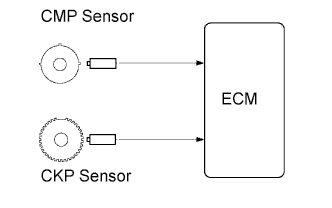 When the engine misfires, high concentrations of hydrocarbons (HC) enter the exhaust gas. Extremely high HC concentration levels can cause increases in exhaust emission levels. High concentrations of HC can also cause increases in the Three-Way Catalytic Converter (TWC) temperature, which may cause damage to the TWC. To prevent these increases in emissions and to limit the possibility of thermal damage, the ECM monitors the misfire rate. When the temperature of the TWC reaches the point of thermal degradation, the ECM blinks the MIL. To monitor misfires, the ECM uses both the Camshaft Position (CMP) sensor and the Crankshaft Position (CKP) sensor. The CMP sensor is used to identify any misfiring cylinders and the CKP sensor is used to measure variations in the crankshaft rotation speed. Misfires are counted as when the crankshaft rotation speed variations exceed predetermined thresholds. If the misfire rate exceeds the threshold level, and could cause emission deterioration, the ECM illuminates the MIL and sets a DTC.
When the engine misfires, high concentrations of hydrocarbons (HC) enter the exhaust gas. Extremely high HC concentration levels can cause increases in exhaust emission levels. High concentrations of HC can also cause increases in the Three-Way Catalytic Converter (TWC) temperature, which may cause damage to the TWC. To prevent these increases in emissions and to limit the possibility of thermal damage, the ECM monitors the misfire rate. When the temperature of the TWC reaches the point of thermal degradation, the ECM blinks the MIL. To monitor misfires, the ECM uses both the Camshaft Position (CMP) sensor and the Crankshaft Position (CKP) sensor. The CMP sensor is used to identify any misfiring cylinders and the CKP sensor is used to measure variations in the crankshaft rotation speed. Misfires are counted as when the crankshaft rotation speed variations exceed predetermined thresholds. If the misfire rate exceeds the threshold level, and could cause emission deterioration, the ECM illuminates the MIL and sets a DTC.DTC No.
| DTC Detection Condition
| Trouble Area
|
P0300
| Simultaneous misfiring of several cylinders detected
(2 trip detection logic)
| - Open or short in engine wire harness
- Connector connection
- Vacuum hose connections
- Ignition system
- Injector
- Fuel pressure
- Mass Air Flow (MAF) meter
- Engine Coolant Temperature (ECT) sensor
- Compression pressure
- Valve clearance
- Valve timing
- Ventilation valve and hose
- Ventilation hose connection
- Air induction system
- ECM
|
P0301
P0302
P0303
P0304
| Misfiring of specific cylinder detected
(2 trip detection logic)
|
When DTCs for misfiring cylinders are randomly set, but DTC P0300 is not set, it indicates that misfires have been detected in different cylinders at different times. DTC P0300 is only set when several misfiring cylinders are detected at the same time.
WIRING DIAGRAM
Wiring diagram of the ignition system.Wiring diagram of the injector circuit.
CONFIRMATION DRIVING PATTERN
- Connect the intelligent tester to the DLC3.
- Turn the ignition switch to the ON position and turn the tester on.
- Record the DTC(s) and freeze frame data.
- Using the tester, switch the ECM from normal mode to check mode (CAMRY_ACV40 RM000000PDL01VX.html).
- Read the misfire counts of each cylinder (Cylinder #1, #2, #3 and #4) with the engine in an idling condition. If any misfire count is displayed, skip the following confirmation driving pattern.
- Drive the vehicle several times with the conditions, such as engine rpm and engine load, shown in Misfire RPM and Misfire Load in the Data List.
- HINT:
- In order to store misfire DTCs, it is necessary to drive the vehicle for the period of time shown in the table below, with the Misfire RPM and Misfire Load in the Data List.
Engine RPM
| Duration
|
Idling
| 5 minutes 30 seconds or more
|
1,000
| 4 minutes or more
|
2,000
| 2 minute 30 seconds or more
|
3,000
| 1 minute 30 seconds or more
|
- Check whether misfires have occurred by checking for DTCs and freeze frame data.
- HINT:
- Do not turn the ignition switch off until the stored DTC(s) and freeze frame data have been recorded. When the ECM returns to normal mode (default), the stored DTC(s), freeze frame data and other data will be erased.
- Record the DTC(s), freeze frame data and misfire counts.
- Turn the ignition switch off and wait for at least 5 seconds.
INSPECTION PROCEDURE
- HINT:
- If any DTCs other than misfire DTCs are output, troubleshoot those DTCs first.
- Read freeze frame data using the intelligent tester. The ECM records vehicle and driving condition information as freeze frame data the moment a DTC is stored. When troubleshooting, freeze frame data can help determine if the vehicle was moving or stationary, if the engine was warmed up or not, if the air-fuel ratio was lean or rich, and other data from the time the malfunction occurred.
- If the misfire does not recur when the vehicle is brought to the workshop, reproduce the conditions stored in the freeze frame data.
- If the misfire still cannot be reproduced even though the conditions stored in the freeze frame data have been duplicated, one of the following factors is considered to be a possible cause of the problem:
- The fuel level is low.
- Improper fuel is used.
- The spark plugs are dirty.
- The problem is complex and involves multiple factors.
- After finishing repairs, check that no misfire occurs in each cylinder (Cylinder #1, #2, #3 and #4).
- Be sure to confirm that no misfiring cylinder DTCs are set again by conducting the confirmation driving pattern, after the repairs.
- For 6 and 8 cylinder engines, the ECM intentionally does not set the specific misfiring cylinder DTCs at a high engine RPM. If misfires only occur during high engine RPM driving, only DTC P0300 is set.
In the event of DTC P0300 being present, perform the following operations:
- Clear the DTC (CAMRY_ACV40 RM000000PDK0D5X.html).
- Start the engine and conduct the confirmation driving pattern.
- Read the misfiring rates of each cylinder or DTC(s) using the tester.
- Repair the cylinder(s) that has a high misfiring rate or is indicated by the DTC.
- After finishing repairs, conduct the confirmation driving pattern again, in order to verify that DTC P0300 is not set.
- When either Short FT #1 or Long FT #1 in the freeze frame data is outside the range of +-20%, the air-fuel ratio may be rich (-20% or less) or lean (+20% or more).
- When the Coolant Temp in the freeze frame data is less than 75°C (167°F), the misfires occurred only while warming up the engine.
| 1.CHECK ANY OTHER DTCS OUTPUT (IN ADDITION TO MISFIRE DTCS) |
Connect the intelligent tester to the DLC3.
Turn the ignition switch to the ON position and turn the tester on.
Select the following menu items: Powertrain / Engine and ECT / DTC.
Read the DTCs.
- Result:
Display (DTC Output)
| Proceed to
|
P0300, P0301, P0302, P0303 and/or P0304
| A
|
P0300, P0301, P0302, P0303 and/or P0304 and other DTCs
| B
|
- HINT:
- If any DTCs other than P0300, P0301, P0302, P0303 and P0304 are output, troubleshoot those DTCs first.
| 2.READ VALUE USING INTELLIGENT TESTER (MISFIRE RPM AND MISFIRE LOAD) |
Connect the intelligent tester to the DLC3.
Turn the ignition switch to the ON position and turn the tester on.
Select the following menu items: Powertrain / Engine and ECT / Data List / Misfire RPM and Misfire Load.
Read and note the Misfire RPM and Misfire Load (engine load) values.
- HINT:
- The Misfire RPM and Misfire Load indicate the vehicle conditions under which the misfire occurred.
| 3.CHECK VENTILATION HOSE CONNECTIONS |
- OK:
- Ventilation hose is connected correctly and is not damaged.
| | REPAIR OR REPLACE VENTILATION HOSE |
|
|
| 4.CHECK MISFIRE COUNT (CYLINDER #1, #2, #3 AND #4) |
Connect the intelligent tester to the DLC3.
Turn the ignition switch to the ON position and turn the tester on.
Clear the DTCs (CAMRY_ACV40 RM000000PDK0D5X.html).
Select the following menu items: Powertrain / Engine and ECT / Data List / Cylinder #1 to #4 Misfire Rate.
Allow the engine to idle.
Read each value for Cylinder #1 to #4 Misfire Rate displayed on the tester. If no misfire counts occur in any cylinders, perform the following procedures:
Shift the gear selector lever to the D position.
Check the Cylinder #1 to #4 Misfire Rate.
If misfire counts are still not displayed, perform steps (g) and (h) and then check the misfire counts again.
Drive the vehicle with the Misfire RPM and Misfire Load noted in the "READ VALUE USING INTELLIGENT TESTER (MISFIRE RPM AND MISFIRE LOAD)" procedures above.
Read the Cylinder #1 to #4 Misfire Rate or DTCs displayed on the tester.
- Result:
Misfire Count
| Proceed to
|
Most misfire occurs in only 1 or 2 cylinders
| A
|
3 cylinders or more have equal misfire counts
| B
|
- HINT:
- If it is difficult to reproduce misfires for each cylinder, check the Data List item called Misfire Margin. Try to find vehicle driving conditions that lower the Misfire Margin value. Values above 30% are considered normal.
- If the freeze frame data's record of the ECT is below 75°C (167°F), the misfire may be detected only when the engine is cold.
- If the freeze frame data's record of the Engine Run Time is below 120 seconds, the misfire may be detected immediately after the engine is started.
| 5.PERFORM ACTIVE TEST USING INTELLIGENT TESTER (FUEL CUT #1 TO #4) |
Allow the engine to idle.
Select the following menu items: Powertrain / Engine and ECT / Active Test / Control the Cylinder #1 to #4 Fuel Cut.
If a cylinder has a high misfire count, cut fuel to the cylinder. Compare the misfire count of the cylinder before fuel cut and after fuel cut.
- Result:
Misfire Count in Each Cylinder
| Proceed to
|
Misfire count of cylinder before fuel cut and after fuel cut roughly same
| A
|
Misfire count of cylinder before fuel cut lower than after fuel cut
| B
|
- NOTICE:
- This Active Test cannot be performed while the vehicle is being driven.
- HINT:
- If the misfire count of the cylinder before and after the fuel cut are roughly the same, the cylinder is misfiring.
- If the misfire count of the cylinder before the fuel cut is lower than after the fuel cut, the cylinder misfires sometimes.
Remove the ignition coil and the spark plug of the misfiring cylinder.
Measure the spark plug electrode gap.
- Standard gap:
- 1.0 to 1.1 mm (0.039 to 0.043 in.)
Check the electrode for carbon deposits.
- Recommended spark plug:
Manufacturers
| Product
|
DENSO
| SK20R11
|
NGK
| IFR6A11
|
- NOTICE:
- If the electrode gap is larger than standard, replace the spark plug. Do not adjust the electrode gap.
Reinstall the ignition coil and the spark plug.
Perform a spark test.
- CAUTION:
- Always disconnect all fuel injector connectors.
- NOTICE:
- Do not crank the engine for more than 2 seconds.
Remove the ignition coil from the cylinder head.
Install the spark plug onto the ignition coil.
Disconnect the 4 fuel injector connectors.
Attach the spark plug assembly to the cylinder head.
Crank the engine for less than 2 seconds and check for sparks.
- OK:
- Sparks jump across electrode gap.
Reconnect the 4 fuel injector connectors.
Install the ignition coil.
| 8.CHECK CYLINDER COMPRESSION PRESSURE OF MISFIRING CYLINDER |
Measure the cylinder compression pressure of the misfiring cylinder (CAMRY_ACV40 RM000000YHZ00YX_01_0008.html).
| NG |
|
|
|
| CHECK ENGINE TO DETERMINE CAUSE OF LOW COMPRESSION |
|
| 9.CHECK NORMAL SPARK PLUG AND CHECK FOR SPARKS OF MISFIRING CYLINDER |
Change the installed spark plug with a spark plug that functions normally.
Perform a spark test.
- CAUTION:
- Always disconnect all fuel injector connectors.
- NOTICE:
- Do not crank the engine for more than 2 seconds.
Install the spark plug onto the ignition coil.
Disconnect the 4 fuel injector connectors.
Attach the spark plug assembly to the cylinder head.
Crank the engine for less than 2 seconds and check for sparks.
- OK:
- Sparks jump across electrode gap.
Reconnect the 4 fuel injector connectors.
Install the ignition coil.
| | REPLACE IGNITION COIL ASSEMBLY THEN CONFIRM THAT THERE IS NO MISFIRE |
|
|
| 10.INSPECT ECM TERMINAL OF MISFIRING CYLINDER (#10, #20, #30 AND/OR #40 VOLTAGE) |
Disconnect the C24 ECM connector.
Turn the ignition switch to the ON position.
Measure the voltage between the terminals of the ECM connector.
- Standard voltage:
Tester Connection
| Specified Condition
|
#10 (C24-108) - E01 (C24-45)
| 9 to 14 V
|
#20 (C24-107) - E01 (C24-45)
|
#30 (C24-106) - E01 (C24-45)
|
#40 (C24-105) - E01 (C24-45)
|
Reconnect the ECM connector.
| 11.CHECK HARNESS AND CONNECTOR (INJECTOR - ECM) |
Disconnect the C7 to C10 injector connectors (of the misfiring cylinder).
Disconnect the C24 ECM connector.
Turn the ignition switch to the ON position.
Measure the resistance and voltage between the injector and the ECM connector terminals.
- Standard voltage:
Cylinder
| Tester Connection
| Specified Condition
|
No. 1
| C7-1 - Body ground
| 11 to 14 V
|
No. 2
| C9-1 - Body ground
|
No. 3
| C8-1 - Body ground
|
No. 4
| C10-1 - Body ground
|
- Standard resistance:
Cylinder
| Tester Connection
| Specified Condition
|
No. 1
| C7-2 or #10 (C24-108) - Body ground
| 10 kΩ or higher
|
C7-2 - #10 (C24-108)
| Below 1 Ω
|
No. 2
| C9-2 or #20 (C24-107) - Body ground
| 10 kΩ or higher
|
C9-2 - #20 (C24-107)
| Below 1 Ω
|
No. 3
| C8-2 or #30 (C24-106) - Body ground
| 10 kΩ or higher
|
C8-2 - #30 (C24-106)
| Below 1 Ω
|
No. 4
| C10-2 or #40 (C24-105) - Body ground
| 10 kΩ or higher
|
C10-2 - #40 (C24-105)
| Below 1 Ω
|
Reconnect the injector connectors.
Reconnect the ECM connector.
| | REPAIR OR REPLACE HARNESS OR CONNECTOR |
|
|
| 12.CHECK FUEL INJECTOR OF MISFIRING CYLINDER |
Check the injector injection (whether fuel volume is high or low, and whether injection pattern is poor).
| | REPLACE FUEL INJECTOR ASSEMBLY |
|
|
| 13.CHECK VALVE CLEARANCE OF MISFIRING CYLINDER |
| 14.CHECK AIR INDUCTION SYSTEM |
Check the air induction system for vacuum leakage.
- OK:
- No leakage from air induction system.
| | REPAIR OR REPLACE AIR INDUCTION SYSTEM |
|
|
| 15.READ VALUE USING VALVE TIMING |
Remove the cylinder head cover.
Turn the crankshaft pulley, and align its groove with the timing mark "0" on the timing chain cover.
Check that the timing marks on the camshaft timing sprocket and camshaft timing gear are facing upward as shown in the illustration.
- If not, turn the crankshaft 1 revolution (360°), then align the marks as above.
- OK:
- Timing marks on camshaft timing gears are aligned as shown in the illustration.
Reinstall the cylinder head cover.
Check the fuel pressure (CAMRY_ACV40 RM000000YCR00RX_01_0002.html).
| | CHECK AND REPLACE FUEL PUMP, PRESSURE REGULATOR, FUEL PIPE LINE AND FILTER |
|
|
| 17.READ VALUE USING INTELLIGENT TESTER (COOLANT TEMP) |
Connect the intelligent tester to the DLC3.
Turn the ignition switch to the ON position and turn the tester on.
Select the following menu items: Powertrain / Engine and ECT / Data List / Primary / Coolant Temp.
Read the Coolant Temp twice, when the engine is both cold and warmed up.
- Standard:
- With cold engine: Same as ambient air temperature.
With warm engine: Between 75°C and 100°C (167°F and 212°F).
| | REPLACE ENGINE COOLANT TEMPERATURE SENSOR |
|
|
| 18.READ VALUE USING INTELLIGENT TESTER (MAF) |
Connect the intelligent tester to the DLC3.
Turn the ignition switch to the ON position and turn the tester on.
Select the following menu items: Powertrain / Engine and ECT / Data List / Primary / MAF and Coolant Temp.
Allow the engine to idle until the Coolant Temp reaches 75°C (167°F) or more.
Read the MAF with the engine in an idling condition and at an engine speed of 2,500 rpm.
- Standard:
- MAF while engine idling: Between 0.54 g/sec. and 4.33 g/sec. (Manual transaxle), Between 0.58 g/sec. and 4.67 g/sec. (Automatic transaxle), (shift position: N, A/C: OFF).
MAF at an engine speed of 2,500 rpm: Between 3.33 g/sec. and 9.17 g/sec. (shift position: N, A/C: OFF).
| | REPLACE MASS AIR FLOW METER |
|
|
| OK |
|
|
|
| CHECK FOR INTERMITTENT PROBLEMS |
|

